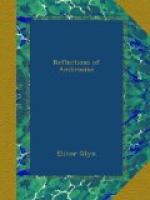“You are laughing at me!”
“No, I am not. I am deeply interested. Go on,” and he leaned back in the straight-backed arm-chair.
“‘Never stay in the mud,’ was another of grandmamma’s maxims. ’It happens that the best of us may fall there in life, but no one need stay there,’ she used to say. Even the common people could rise out of it if they a fine enough spirit. But we were the examples, and one must never give a bad example. For instance, the common people might cry when they were hurt. They were only lower creatures and under the protection of the others. They could roar, if it pleased them, as they were the model of no one. But we could not cry, to encourage this foolishness.”
“And so you lived and learned all that, dear little Comtesse! No wonder your eyes are so wise.”
“I remember once I became impatient with some new stitches in my embroidery that would not go right, and I flung the piece down and stamped on it and tore it. Grandmamma said nothing, but she deliberately undid a ball of silk and tangled it dreadfully, and then gave it to me to straighten out. It was not to irritate me, she said. But patience and discipline were necessary to enable one to get through life with decency and pleasure, and while I untangled the silk I should have time to reflect upon how comically ridiculous I had been to throw down and trample upon an inanimate thing that only my personal stupidity had caused to annoy me.”
Antony looked at me a long time. He sighed a short, quick sigh, and then said, gayly:
“You must certainly write a book for the training of the young. But what did your grandmother say of such things as strong passions—the mad love of one person for another, for instance? Could they be ruled by maxims?”
“She did not discuss those things with me. But she did say that in life, now and then, there came a coup de foudre, which sometimes was its glory and sometimes not; that this was nature, and there was no use going absolutely contrary to nature; but that a disciplined person was less likely to commit a betise, or to mistake a passing light for the coup de foudre, than one who was accustomed to give way to every emotion, as a trained soldier is better able to stand fire than the raw recruit from the fields.”
“And yet the trained soldier goes under sometimes.”
“In that case, she said, there were only two courses—either to finish the matter and go out altogether, or to get up again and fight better next time.”
Antony looked down at me. He shaded his eyes with his hand, and it seemed as if he were observing something in my very soul. Then he said, with a whimsical smile, “Comtesse, tell me. And did she consider there were any great sins?”
“Oh yes. To break one’s word, or in any way degrade one’s race. But she said sins were not so much sins in themselves as in their facon de faire. One must remain a gentlewoman—or man—always, even in moments of the greatest tourbillons. ’We are all of flesh and blood,’ she said, ’but in the same situation the fille de chambre conducts herself differently to the femme de qualite.’ What a serious impression I am giving you of grandmamma, though! She was a gay person, full of pleasant thoughts.”




